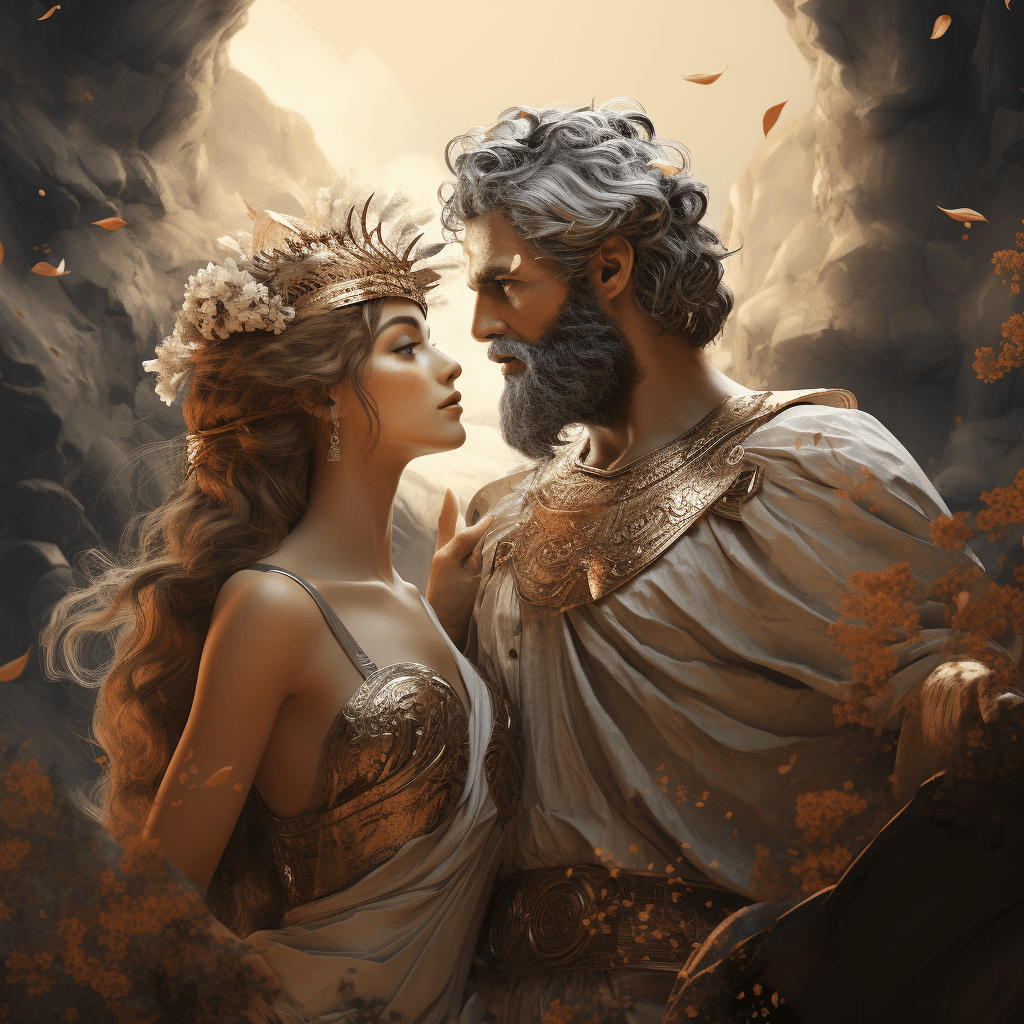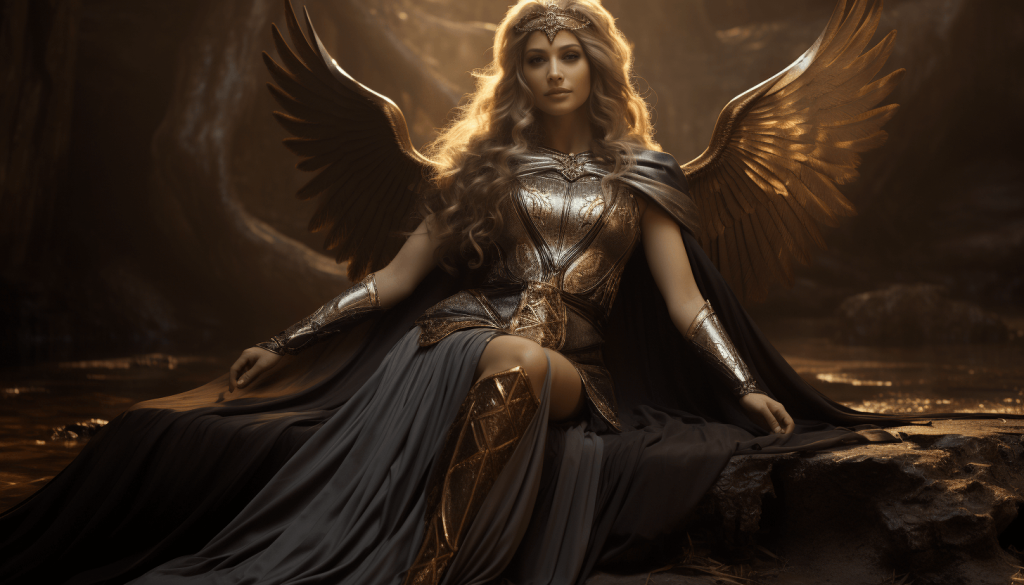Hera: An Introduction to the Queen of Olympus
The divine world of ancient Greek mythology boasts many fascinating figures, but few are as revered and formidable as Hera. As the leading lady of Mount Olympus, she held a significant place in the hearts and minds of ancient Greeks, symbolizing marriage, motherhood, and protector of family values. Yet, delving deeper into her myths reveals an intricate tapestry of stories that encapsulate much more than just these roles.
Origins and Early Myths Surrounding Hera
Emerging from the lineage of Titans Cronus and Rhea, Hera, much like her siblings, had a tumultuous start. To prevent the prophecy of being overthrown by his children, Cronus swallowed them whole. However, thanks to the cunning of Rhea and the aid of Gaia, Hera, along with her brothers and sisters, were eventually freed by Zeus, the youngest of the siblings.
“In her eyes, the ancient Greeks saw the embodiment of a protective mother, a loyal wife, but also the fierce storm that follows a betrayal.”
Symbols and Epithets Associated with Hera
- Peacock: Representing her beauty and pride, the peacock, with its splendid tail, was considered Hera’s sacred bird. The eyes on the peacock’s feathers were seen as a symbol of watchfulness.
- Diadem and Veil: Often depicted wearing them, these symbolized her majesty and role as the queen of Olympus.
- Cow: A creature sacred to Hera, it represented her nurturing aspect and her watchfulness.
The Milky Way is said to have been created by Hera. While nursing Heracles, some of the milk spilled, forming the celestial pathway we now recognize as the Milky Way.
Hera, the Queen of the Gods in Greek mythology, was both the wife and sister of Zeus. Symbolizing marriage and motherhood, she was revered as a protector of familial values. Noted for her beauty and pride, Hera is often associated with the peacock and the cow. Despite her dignified stature, she was also known for her fierce temperament in defending her domain and loved ones.
Hera and Zeus: A Divine Union

The union of Hera and Zeus is an iconic narrative within Greek mythology. Not only are they known as the reigning monarchs of the Olympian pantheon, but their relationship also embodies a multitude of complexities.
The Beginning: Courtship and Marriage
Legend has it that Zeus, smitten by Hera’s beauty and grace, pursued her for courtship. However, it was no ordinary love story. To woo her, Zeus took on various forms, including that of a distressed bird during a storm. Hera, taking pity on the creature, held it close to her chest. Seizing the opportunity, Zeus transformed back into his divine form and declared his love for her. This cunning act led to their eventual union, culminating in a grand wedding attended by all the gods and creatures of the ancient world.
Strife and Reconciliation
However, their marital life was far from serene. Zeus’s numerous affairs with mortals and deities alike often ignited Hera’s wrath. Her retaliation against these transgressions are well-documented in various myths, where she either punishes Zeus’s lovers or their offspring. Despite these conflicts, there were moments of reconciliation between the two, reminding the world of their deep bond. In one such story, Zeus, realizing the weight of his actions, gifted Hera the Garden of Hesperides as an apology.
Power Dynamics: King and Queen of Olympus
- Shared Governance: Both Zeus and Hera had their respective realms of influence. While Zeus governed the sky and was often seen as the overarching ruler, Hera’s domain was marriage and childbirth, crucial facets of ancient Greek society. Together, they maintained the balance of power on Mount Olympus.
- Mediators and Diplomats: Hera’s wisdom often made her a mediator among the gods, resolving disputes and ensuring harmony. Zeus, with his lightning bolt, acted as the enforcer, ensuring that divine law was maintained.
- Guardians of Marriage: As symbols of matrimony, they were invoked during wedding ceremonies. Couples sought their blessings for a prosperous and harmonious marital life.
Legacy: A Relationship Immortalized
The tales of Hera and Zeus not only give insight into the dynamics of divine relationships but also mirror the trials and tribulations faced by mortal couples. Their stories, rife with passion, jealousy, betrayal, and devotion, have transcended time, offering timeless lessons on love and commitment.
Hera’s Role in Greek Mythology
Undeniably, Hera occupies a paramount position within the tapestry of Greek myths. As the Queen of the Gods, she holds immense sway both in the celestial realms and the tales that have traveled through millennia. But what precisely is Hera’s significance in these ancient stories? Let’s delve deeper into her role and influence.
The Protector of Marriage
Hera’s primary domain is that of marriage and childbirth. Ancient Greeks revered her as the guardian of matrimonial bonds. Brides sought her blessings, and ceremonies often invoked her name, asking for marital harmony and offspring. The sanctity of this bond was something Hera herself was quite passionate about, as evidenced by her frequent confrontations with Zeus over his many indiscretions.
Retributive Justice
While many Greek gods are known for their wrath, Hera’s fury was particularly feared. When slighted, especially concerning matrimonial matters, she would often unleash her vengeance. This attribute is vividly displayed in tales involving Zeus’s lovers and their offspring, where Hera’s actions range from subtle tricks to outright curses. Io, turned into a cow and pursued by a gadfly, and the tragic fate of Hercules are but two examples of her potent wrath.
Patroness of Empires and Cities
- Argos: Hera had a special place in the city of Argos, where she was revered as its chief deity. The Heraion of Argos, one of the most ancient temples in Greece, stands as a testament to her influence.
- Samos: This island also boasted a grand temple in her honor, underscoring her significance in the region.
Symbolism in Art and Literature
Hera’s visage and symbols were a frequent motif in ancient Greek art. From grand sculptures capturing her regal poise to intricate vase paintings narrating her tales, her influence was omnipresent. Literature too wasn’t untouched. Poets and playwrights often utilized her character, sometimes as a just and protective figure, while at other times emphasizing her vengeful nature.
Interactions with Mortals
Unlike some other gods, Hera’s interactions with mortals were often marked by complexity. She could be a protector, especially of women wronged in marriages, but could also turn adversary if she felt they threatened her status or her marriage. Her involvement in the Trojan War, where she sided against Troy, primarily due to the judgment of Paris favoring Aphrodite over her, exemplifies her intricate relationships with mortals.
As we journey through Greek myths, Hera’s omnipresence becomes palpable. Her tales are not just stories of a deity, but reflections of societal values, marital dynamics, and the human psyche’s multifaceted nature.
The Wrath of Hera: Feuds and Conflicts in Mythology
In the annals of Greek mythology, Hera’s fierce disposition and her tenacity in defending her pride and honor are legendary. While she was revered as the protector of marriage and a formidable goddess, her wrath was a force to be reckoned with. To truly grasp Hera’s influence, it’s vital to delve into the most notable feuds and conflicts she was embroiled in.
Hera’s Pursuit of Io
One of the most riveting tales of Hera’s wrath involves the nymph Io. When Zeus took a liking to Io, he transformed her into a heifer to hide her from Hera’s prying eyes. However, Hera, not easily fooled, took the heifer and tasked the watchful Argus to guard her. The story unfolds with Zeus commissioning Hermes to stealthily eliminate Argus, leading Hera to send a gadfly to torment Io incessantly.
Enmity with Heracles (Hercules)
The very birth of Heracles, Zeus’s son with a mortal woman, was enough to earn Hera’s ire. Determined to make his life difficult, she sent two serpents to kill him as an infant. Heracles, even as a baby, showcased his incredible strength by strangling them. As he grew, Hera’s enmity did not wane; she induced madness in him, leading him to commit grievous acts, which then resulted in his undertaking the famous Twelve Labors as penance.
The Judgment of Paris
In an epic tale leading to the Trojan War, Paris, the prince of Troy, was tasked with deciding who was the fairest among Hera, Athena, and Aphrodite. While each goddess offered a tempting reward, he ultimately chose Aphrodite, leading a slighted Hera to vehemently oppose Troy in the ensuing war.
Confrontation with Leto
Leto, another of Zeus’s interests, found herself in Hera’s crosshairs when she became pregnant with his children, Artemis and Apollo. Hera, in her fury, forbade Leto from giving birth on any mainland or island. It was only the floating island of Delos that offered refuge to Leto, allowing her to deliver her twins.
Resistance to Dionysus’s Birth
- Zeus’s affair with the mortal woman Semele led to the conception of Dionysus. When Hera learned of this, she disguised herself and planted seeds of doubt in Semele’s mind, ultimately leading to her tragic demise. However, Zeus managed to save the unborn Dionysus and see to his eventual birth.
These tales emphasize Hera’s intricate nature – her fierce loyalty to her marital bond, her protective instincts, and her swift retaliation against perceived slights. They paint a portrait of a deity who is both awe-inspiring and formidable, reflecting the multifaceted role she played in the rich tapestry of Greek mythology.
Hera’s Sanctuaries and Places of Worship

The reverence for Hera, Queen of the Gods, was widespread across ancient Greece. Numerous temples and sanctuaries celebrated her honor, acting as centers of worship, pilgrimage destinations, and venues for festivals and ceremonies. Let’s delve into the major sites dedicated to this revered goddess.
| Sanctuary Name | Location | Description |
|---|---|---|
| The Grand Temple of Hera | Olympia | Home to the renowned Heraion, this was a vital religious center where the eternal Olympic flame was lit at Hera’s altar. |
| Heraion of Samos | Samos Island | Known for its architectural splendor, this 8th-century BC temple was among the earliest Ionic temples and one of Greece’s largest. |
| Heraion of Argos | Argos | A primary sanctuary deeply intertwined with Hera’s legends, hosting the Heraean Games, a women-only athletic competition. |
| Hera Akraia | Perachora | A picturesque coastal sanctuary overlooking the Corinthian Gulf. Two temples existed here, one exclusively for Hera Akraia. |
| Temple of Hera | Paestum, Italy | Outside Greece, this temple in Italy stands as a testament to Hera’s influence beyond Greek borders and is a well-preserved Doric temple. |
| Heraion of Delos | Delos Island | Located on the sacred island of Delos, this sanctuary was one of the religious hubs of the Cyclades, dedicated to both Hera and Zeus. |
| Heraion of Kanathos | Nafplio | A lesser-known but significant temple where, according to myth, Hera annually restored her virginity by bathing in the sacred waters of the Kanathos spring. |
From the shores of Samos Island to the heart of Italy, these sacred sites dedicated to Hera not only reflect the architectural marvel of the ancient world but also the deep-seated veneration the ancient civilizations held for the divine.
Comparative Mythology: Hera’s Counterparts in Other Cultures
While Hera stands as a paragon of marriage, royalty, and motherhood in Greek mythology, many cultures around the world feature deities with strikingly similar characteristics. By exploring these figures, we can uncover shared human experiences and understandings about the divine.
Juno: The Roman Analogue
First and foremost, when discussing counterparts to Hera, we must begin with Juno of Roman mythology. As the wife of Jupiter and the queen of the gods, Juno’s attributes and stories are closely aligned with those of Hera. She too was considered a protector of the state and women, especially during childbirth.
Isis: The Egyptian Connection
The Egyptian pantheon boasts Isis, a goddess of health, marriage, and wisdom. Known for her role in the Osiris myth, Isis exemplifies a blend of devotion and power. Her enduring love for her husband, Osiris, and her protective nature toward their son, Horus, draws several parallels with Hera’s narratives.
Frigg: The Norse Equivalent
From the cold realms of Norse mythology, we find Frigg. As the wife of Odin and the queen of the Aesir, Frigg’s dominion encompasses love, fertility, and fate. Much like Hera, she wields considerable influence in the divine realm and plays a crucial role in various mythological episodes.
Parvati: The Indian Affinity
In the vibrant tales of Hindu mythology, Parvati, wife of Shiva, emerges as a central figure of love, devotion, and power. She exemplifies the strength and commitment inherent in the marital bond, qualities that align her with the spirit of Hera.
Amaterasu: The Sun Goddess from Japan
While not a direct counterpart, Japan’s Amaterasu, the sun goddess, holds a place of prominence in the Shinto pantheon, much like Hera’s standing in Greek lore. Renowned for her compassion, she illuminates the world and ensures harmony and balance.
To distill, these divine counterparts underline a universal understanding and recognition of particular divine archetypes. The parallels between Hera and these goddesses, spanning diverse cultures, illustrate the shared essence of human reverence and mythology.
Hera and Her Children: A Look at the Divine Offspring
When delving into the legends of Hera, it becomes imperative to also explore her role as a mother. Despite her often tumultuous relationship with her spouse, Zeus, Hera bore several children, each of whom had unique narratives within Greek mythology. Here, we provide a detailed tableau of Hera’s offspring and their corresponding roles in the annals of Greek tales.
| Child | Description | Notable Achievements |
|---|---|---|
| Ares | God of war, known for his fierce nature and quick temper. | Played a significant role in the Trojan War, aiding the Trojans. |
| Hebe | Goddess of youth and the cupbearer of the gods before Ganymede. | Renowned for her ability to bestow eternal youth, she married Hercules after his deification. |
| Eileithyia | Goddess of childbirth and midwifery. | She was invoked by pregnant women and midwives to ensure safe deliveries. |
| Hephaestus | God of fire, metallurgy, and blacksmiths. Often depicted as lame. | Responsible for crafting many of the gods’ divine weapons, including Zeus’s thunderbolts. |
While the bond between Hera and some of her children, particularly Ares, was strong, her relationship with Hephaestus was rife with conflict, given the tales of his rejection. Nevertheless, the stories of Hera’s children provide insight into her multifaceted nature: protective yet demanding, caring yet exacting. Through their tales, we further understand the depth and complexity of Hera’s character.
Mythical Stories Highlighting Hera’s Cunning and Strategy

While Hera’s fierce temperament often stands out in mythological tales, one should not overlook her sharp wit, intelligence, and propensity for strategic planning. Various myths highlight Hera’s craftiness as she navigates the treacherous waters of divine politics and interpersonal relationships. Here are a few tales that underscore Hera’s cunning and strategic prowess:
- The Deception of Zeus: Perhaps one of the most iconic tales of Hera’s cunning is when she, alongside Poseidon and Athena, conspired to bind Zeus to his bed as a form of protest against his rule. Using a golden chain, they sought to restrict him. Though their plot was foiled by the giant Aegaeon, it showcased Hera’s ability to rally other deities and challenge even the King of Gods.
- Heracles’ Labors: Hera’s antipathy towards Heracles, Zeus’s son with a mortal woman, is legendary. Instead of direct confrontation, Hera used strategy to torment him. She instigated the madness that led Heracles to kill his family, resulting in him undertaking the Twelve Labors as penance. Each task was near-impossible, yet Hera’s intention wasn’t merely punishment, but also to eliminate a potential threat to her power.
- The Trojan War Intrigue: Hera’s political acumen was on full display during the Trojan War. Allying with Athena and Poseidon, she schemed against the Trojans, primarily because Paris had judged Aphrodite fairer than her. Hera’s interventions, including sending detrimental winds against the Trojan fleet, played pivotal roles in the course of the war.
- Io’s Transformation: To protect Zeus’s lover Io from Hera’s wrath, Zeus transformed her into a heifer. However, Hera’s suspicions were aroused, and with slyness, she requested the heifer as a gift, entrapping Io. Hera then sent Argus, a creature with a hundred watchful eyes, to guard her, further showcasing her tactical approach to dealing with Zeus’s infidelities.
These myths not only highlight Hera’s profound intelligence and craftiness but also offer a glimpse into the complexities of divine politics. Hera was more than just Zeus’s wife; she was a formidable strategist and tactician, wielding her influence and intellect with precision.
Understanding Hera Beyond the Myths: Modern Interpretations
Over the ages, Hera’s characterization has transcended ancient Greek mythology, finding resonance in modern literature, art, and psychology. The modern perspective often delves deeper into Hera’s persona, moving past the veneer of jealousy and anger, to understand the multifaceted Queen of the Gods in all her depth and nuance.
The Feminist Interpretation
Modern feminist literature often examines Hera as a symbol of the challenges faced by powerful women in patriarchal settings. Her frequent conflicts with Zeus can be seen as reflective of the struggles many women face in male-dominated societies, battling for agency and respect. Despite her immense power, Hera’s narratives often revolve around her responses to Zeus’s actions, highlighting how women’s stories have historically been overshadowed by male narratives.
In Modern Literature and Cinema
Hera has made appearances in many contemporary works, where she is often portrayed with a mix of her traditional characteristics and modern twists. For instance, in some adaptations, Hera is portrayed as a wise and just ruler, bringing balance to Olympus. In others, she takes on a more villainous role, reminiscent of her vengeful aspects from the myths. These varied portrayals showcase the flexibility and richness of her character, allowing for a wide range of interpretations and artistic liberties.
Psychological Perspectives
In the realm of psychology, Hera can be seen as an archetype representing aspects of marital commitment, power dynamics in relationships, and the complexities of love and jealousy. Carl Jung, the famous Swiss psychiatrist, would likely categorize Hera as an embodiment of the powerful maternal archetype, symbolizing nurturing yet possessive qualities.
Hera in Modern Pop Culture
Pop culture hasn’t remained untouched by Hera’s influence. From comic books to video games, Hera’s character has been adapted to fit various narratives. Whether as the wise matriarch of Olympus or the scorned wife seeking justice, her influence in shaping stories remains undeniable. Many of these adaptations focus on Hera’s strength, leadership, and wisdom, offering a fresh take on an ancient deity.
To truly understand Hera is to recognize that she is more than just the myths that birthed her. Her character, as perceived today, is a tapestry woven from threads of ancient tales, modern interpretations, and the evolving understanding of femininity and power. Hera, in all her incarnations, remains a timeless symbol of strength, strategy, and resilience.
Frequently Asked Questions
How did Greek mythology start?
Greek mythology originated from ancient oral traditions, combined with the stories of early civilizations that interacted with the Greeks. Over time, these stories evolved and were influenced by historical events, other cultures, and the need to explain natural phenomena. Many of these tales were subsequently written down, especially during the Classical period of Greece, in works by poets like Homer and Hesiod.
Is Zeus in love with Hera?
Yes, Zeus and Hera, in most myths, are portrayed as husband and wife, and despite their many conflicts, there are stories that highlight moments of affection and love between them. However, their relationship was complex, marked by both passion and tumult.
Is Hera a real God?
Hera, like other Greek deities, is a figure of mythology. While she was worshipped and revered by the ancient Greeks as a real deity, in contemporary times, she is generally viewed as a symbolic and mythological figure rather than a literal god.
Is Queen Hera Zeus’s sister?
Yes, in Greek mythology, Hera is both the sister and wife of Zeus. They were both offspring of the Titans Cronus and Rhea.
Was Hera good or bad?
Hera is a complex character with multifaceted emotions and actions in Greek mythology. While she is often depicted as vengeful, especially towards Zeus’s lovers and offspring, she is also the goddess of marriage and childbirth, and has moments of wisdom and compassion. Labeling her as purely good or bad oversimplifies her character.
Why is Zeus afraid of Hera?
While Zeus was the king of the gods and often had the upper hand in many situations, he was wary of Hera’s cunning, intelligence, and her ability to exact revenge. Her influence and power on Olympus made her a formidable figure, even for Zeus.
What is Hera’s symbol?
Hera is associated with several symbols, most notably the peacock, the cow, and the pomegranate. Each of these symbols represents various aspects of her persona and domains.
What is Hera’s power?
Hera possesses the standard powers of an Olympian goddess, including immortality and the ability to change her shape. As the queen of the gods, she also had significant influence and authority on Mount Olympus.
Who is stronger, Zeus or Hera?
In terms of raw power, Zeus is often considered the most powerful of the Olympian gods. However, Hera’s strength lay in her cunning, strategy, and influence, which often allowed her to outmaneuver or challenge Zeus in various ways.
Who is Hera afraid of?
While Hera is a powerful goddess, she, like other Olympian deities, had her own fears and vulnerabilities. In certain myths, she feared the repercussions of Zeus’s anger and the potential overthrow of her position on Olympus.
What happened to Zeus after Hera ate him?
It’s a common misconception. Hera did not eat Zeus. It was actually Zeus’s father, Cronus, who swallowed his children to prevent a prophecy that stated one of his offspring would overthrow him. Zeus was saved from this fate, and he eventually freed his siblings from Cronus’s stomach.
Who betrayed Hera?
One notable betrayal Hera faced was from the hero Prometheus. Despite being on the side of the gods during the Titanomachy, Prometheus later defied Zeus and Hera by stealing fire for humanity. This act of defiance did not sit well with Hera.
Did Hera punish Zeus’s lovers?
Yes, Hera was notorious for seeking revenge against Zeus’s lovers and their offspring. Some of the most well-known stories involve her punishing Leto, Io, and Semele, among others.
Why didn’t Hera cheat on Zeus?
While Zeus had numerous affairs, Hera’s infidelities were rare in myths. Her role as the goddess of marriage and her pride in her position as queen of the gods might have influenced her fidelity. However, there are a few myths where Hera had relations outside her marriage, but these are less common.
Why did Hera hate Zeus?
Hate might be a strong term, but Hera had multiple reasons to be upset with Zeus. His numerous affairs and the offspring from these liaisons often provoked Hera’s jealousy and wrath. Moreover, Zeus’s decisions and actions sometimes went against Hera’s wishes, causing conflicts between them.
Discover the Greek Gods and Goddesses
Dive quickly into the mystical world of Greek gods and goddesses. Learn more about their realms by visiting the links below.

